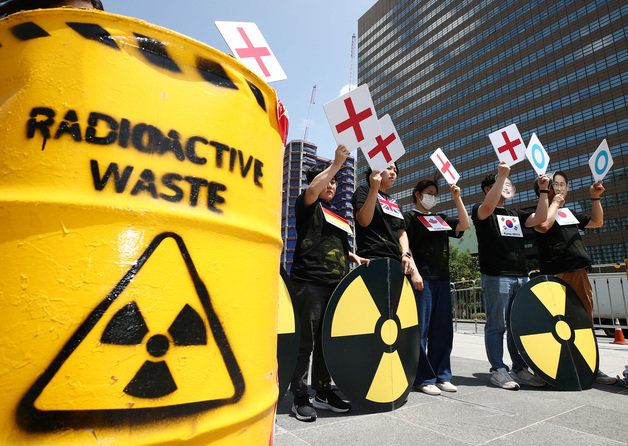The Fukushima contaminated water inspection team dispatched by the Korean government to Japan requested additional data on the performance and long-term management plan of ALPS in consultation with Japanese government officials on the 25th.
The Fukushima contaminated water inspection team, consisting of around 20 members, including executives of the Korea Nuclear Safety and Security Commission and marine environment experts, visited the Ministry of Foreign Affairs of Japan on the 25th and held discussions with officials from the Ministry of Economy, Trade, Industry, and Energy, the Nuclear Regulatory Agency, and Tokyo Electric Power.
According to the Fukushima regional media, the Korean polluted water inspection team requested additional data from the Japanese side on the performance of ALPS and long-term management plans in response to power outages. ALPS is a facility that removes radioactive materials. However, the limitation is that it cannot filter out nuclides such as tritium and carbon-14.
Prior to the consultation, the Korean contaminated water inspection team visited the Fukushima No. 1 nuclear power plant where radioactively contaminated water occurred on the 23rd and 24th, and inspected ALPS and contaminated water storage tanks, water intake facilities, and contaminated water dilution discharge facilities such as emergency shut-off valves to stop discharge in case of emergency. looked around
The inspection team returning to Korea on the 26th confirms safety based on the safety evaluation and inspection contents of the International Atomic Energy Agency (IAEA), which will be announced at the end of June, and reports the results to the public.
Yoo Gook-hee, head of the Fukushima contaminated water inspection team, said, “There are things that have been confirmed in this inspection, and there are additional data that have been requested. We are working on receiving the data and further analyzing and confirming it,” he explained.
On the 25th, Akira Ono, chief executive officer of TEPCO’s Fukushima Decommissioning Company, who was in charge of guiding the Korean polluted water inspection team, said, “We responded seriously to help understanding in Korea. If there are any questions from the inspection team, we will respond wholeheartedly in the future.”
 Members of the Environmental Health Citizen Center hold a press conference at Gwanghwamun Square in Jongno-gu, Seoul on the 19th to urge the G7 summit countries and invited countries to express their opposition to dumping contaminated water from the Fukushima nuclear power plant in Japan into the Pacific Ocean. 2023.5.19. news 1
Members of the Environmental Health Citizen Center hold a press conference at Gwanghwamun Square in Jongno-gu, Seoul on the 19th to urge the G7 summit countries and invited countries to express their opposition to dumping contaminated water from the Fukushima nuclear power plant in Japan into the Pacific Ocean. 2023.5.19. news 1Meanwhile, the Yomiuri Shimbun pointed out that the concerns of the Korean people have not been dispelled. Citing a joint opinion poll by four Korean media outlets, it was reported on the 26th that 53% of the people said “it is not helpful” and 40% “it is helpful” to the inspection team.
As scheduled, the Japanese government plans to mix contaminated water containing radioactive materials accumulated at the Fukushima Daiichi Nuclear Power Plant with seawater and dilute the concentration of tritium below the standard before discharging it. Discharge is expected to begin around summer.
Source: Donga
Mark Jones is a world traveler and journalist for News Rebeat. With a curious mind and a love of adventure, Mark brings a unique perspective to the latest global events and provides in-depth and thought-provoking coverage of the world at large.